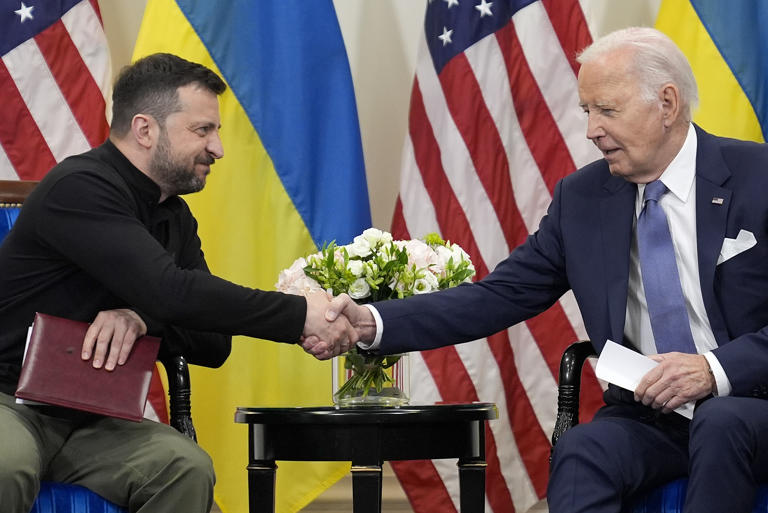U.S. President Joe Biden publicly apologized to Ukrainian President Volodymyr Zelenskyy for a months-long congressional delay in American military assistance, which allowed Russia to make gains on the battlefield.
During their meeting in Paris, following the 80th anniversary of the D-Day landings in Normandy, Biden expressed regret for the six-month delay caused by conservative Republicans in Congress blocking a $61 billion aid package. “I apologize for those weeks of not knowing what’s going to happen in terms of funding,” Biden stated, assuring Zelenskyy that the U.S. remains committed to Ukraine. “We’re still in. Completely. Thoroughly.”
Zelenskyy, drawing parallels to World War II, urged for bipartisan support from the U.S., mirroring the coalition that freed Europe from Nazi Germany. He expressed gratitude to American lawmakers for eventually approving the critical weapons package that has recently helped Ukraine counter Russian advances.
“It’s very important that in this unity, United States of America, all American people stay with Ukraine like it was during World War II,” Zelenskyy said. “How the United States helped to save human lives, to save Europe. And we count on your continuing support in standing with us shoulder to shoulder.”
The U.S. remains Ukraine’s largest wartime supporter, providing significant military aid to combat an intense Russian offensive in eastern Ukraine. The delay in Western weaponry delivery and Biden’s cautious approach to avoid escalating tensions with Russian President Vladimir Putin have been points of contention between the two leaders.
On Friday, Biden announced an additional $225 million in military aid for Ukraine, including munitions for the High Mobility Artillery Rocket System (HIMARS), mortar systems, and artillery rounds. The aid package aims to bolster Ukraine’s defense and support the reconstruction of its electric grid through enhanced air and missile defense systems.
A recent Ukrainian strike using U.S.-made ATACMS missiles in the Luhansk region resulted in casualties, further intensifying the conflict. Despite the risks, some NATO allies, including the U.S., have eased restrictions on Ukraine using supplied weapons for limited attacks inside Russia, eliciting a stern warning from the Kremlin.
Biden reaffirmed the U.S. commitment to Ukraine, drawing historical connections between the fight against Nazi Germany and the current conflict.
In a speech at the French National Assembly, Zelenskyy highlighted the historical significance of Ukraine’s struggle. “This battle is a crossroads,” Zelenskyy declared. “A moment where we can now write history the way we need it. Or we can become victims of history as it suits … our enemy.” His address received frequent applause and a standing ovation.
French President Emmanuel Macron, reinforcing France’s support, announced the provision of Mirage combat aircraft to Ukraine. Macron has maintained a strong stance, suggesting that deploying Western troops in Ukraine is not “ruled out.”
Zelenskyy’s visit to Paris included defense agreements and a meeting with Macron at the Élysée Palace, furthering Ukraine’s efforts to secure sustained military support and international solidarity.



